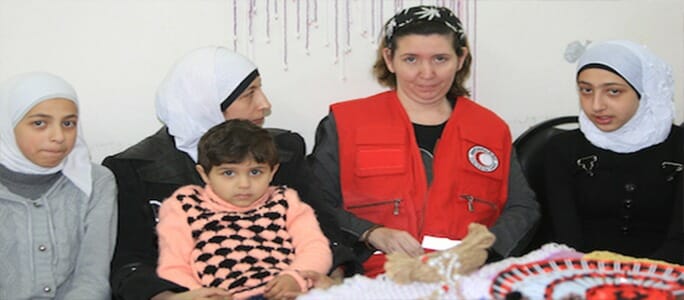A SARC volunteer with Rania al-Boush and her two young daughters and son at the SARC psychosocial support centre.
By Viviane Tou’meh, Syrian Arab Red Crescent
Rania al-Boush is 40 years old and is mother to three girls and two boys. In early 2013 she was forced to leave her home in al-Mleha, Rural Damascus and now lives in the Duwaila neighbourhood of Damascus.
“The crisis has affected everyone in my family,” she says. The lack of space has caused problems for the whole family, but the two young boys have found it especially hard to cope with the changes. “Life changed a lot to them’ Rania says. “They became very aggressive and nervous. You cannot imagine how hard it is for a family of seven living in one room.”
Her husband is a tailor, and his job affected badly with the crisis. Previously, he was earning from 30,000 to 40,000SYP each month, but now his monthly earnings do not go above 8,000SYP.
“My husband’s family also has been displaced from their home and now they live in one of the collective shelters in Damascus. He feels shame because now we are living with my family. He wanted to rent a house for us to live separately but there was no money to rent a house or even a room.”
“My oldest daughter Aya, is 16 years old, she left the school and does not want to return.”
Safaa, a mother of four, fled from Zamalka to Jaramana with her four children. She says her first priority is finding somewhere safe to stay. “I hope I can find a room for my children,” she says. “We need a house. Some generous people donated for us to pay the rent of the house which is 15,000SYP, and SARC provided more help, but still we need a lot.”
Food, is a major worry. “The food parcel we received do not contain meat and vegetables, and I have no source of income, so how I can cook good meals for my children?” Safaa says. Aiham, who is 7 years old, suffers from speech problems after being trapped with his father in Zamalka for a week. “He still cries when he hear any bombing and says: ‘Mum take me away’.”
Nadeen Hilwani, a psychosocial first aider in this center says displacement is often hardest for the children. “They are depressed by the situation, and they feel fear from loud voices, and from strangers, and always they prefer to stay together,” she says.
“When we find difficult cases such as Aiham case we immediately refer it to the Syrian Arab Red Crescent’s (SARC) psychological clinic so he can be seen by a trained specialist.”
To meet increasing humanitarian needs, SARC work is on-going to pre-position essential supplies such as bottled water, water tanks and purification tablets, jerry cans, nutritional supplies, hygiene and diarrheal disease kits, soap, blankets, winter clothes and other household materials.
With nothing to live on, both Rania and Safaa’ needed extensive support, and they found it with the Red Crescent.
Rania usually visits the SARC Psychosocial support center in Duweela with her daughters, and takes part in activities like handicrafts and mothers’ workshops. She has learnt new skills such as spinning handloom and needlework, and has finished many handmade pieces.
Blinking back tears, Rania remembered the old days; her home, her family. “How can my children cope with all of this?” she asks.



Discussion about this post